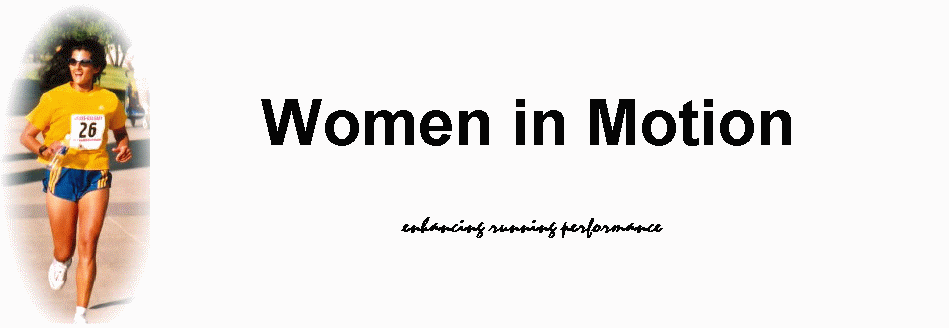| MENU |

Weight Loss and Running There have been many posts on the Running Woman Board regarding Weight Loss and Running It is hoped that this article will provide some information on that subject.
Weight Loss and Running When
you begin a weight loss program through exercise, weight
drops off quickly due to water loss. Marathon runners
will lose 7-10 pounds due to water loss, but only up to
one pound due to the activity. This explains why it is
important to hydrate as you run. Calories
burned while running is directly related to the distance
covered, the faster you walk or run translates into a
greater distance. Some individuals think that if they run
5 miles as opposed to walking the 5 miles, they burn off
more calories. This is not necessarily the case. Long runs of 22 km or
more, may increase the metabolism, but only for a short
time. Muscles
will tone up and can increase in mass, thus adding to
your weight. Competitive runners also weight train and
this produces the weight gain. Again you need to diet
carefully, be concerned with sugar content, but also fat
content. Just
carry on running, watch your diet, check the amount of
calories you are consuming, and don't weigh yourself. As
soon as your clothes feel loose, buy a smaller size. Walking Vrs Running Walking
does burn a greater percentage of its calories from fat.
The reason for this is because walking is a purely aerobic
activity, meaning oxygen using. Running burns a lesser
percentage of calories from fat. But it burns so many
more calories than walking, that a greater weight loss is
possible from running than walking. Walking is great for
losing weight if you have 4 hours a day to walk. Walk for
4 hours or run for 1 hour. The choice is obvious. Weight
loss comes from burning more calories/day than you
consume. There is no other way to lose weight, than
burning more than you consume. Where the calories come
from, carbs, sugar, or fat, is not that important. The
after burn from intense exercise is more important than
how many calories are burned during the exercise as your
metabolism is boosted much higher after a bout of intense
exercise than from moderate exercise. If you burn all of
the carbs/sugars in your body during the run, the
calories for normal metabolism come from the only thing
that is left, fat. Fat will always be your body's last
choice for energy. I
would say that walking is great for the average person
who needs to do something. Walking involves much less
effort mentally and physically so more people are willing
to stick with it. Research
regarding fitness and exercise shows that intense
exercise is much better than moderate exercise. The
longer and more intense a workout is, the more benefits
you get from it. That means less body fat, lower chance
of heart disease, lower blood pressure, and in the end
you live longer. Older
people who walk are at least doing something. Many people
have bad experiences of running laps in gym class. It
takes time to overcome a mental dislike of a sport The
body runs on certain fuels: fats, carbs, and sugars. When
these are not present, your body can also break down
muscle tissue to supply energy needs. That is why runners
need to make sure they get protein in their diet. When
your muscle mass diminishes, so does your metabolism.
Your body will break down muscle before fat to feed the
body's energy needs if it has to do so. Generally,
you burn calories based on transporting weight over
distance. So if you use the same muscles to transport the
same weight over 10K running vs. walking you burn about
the same number of calories - only you do it much faster
running. You burn more calories when you involve more
muscle groups (i.e.racewalking as it uses more muscle
groups than walking or running). To
lose fat you need to eat fewer calories than you expend
each day. It also helps to be building muscle at the same
time. For
an increased lifespan and prevention of heart disease,
walking a half hour to an hour a day at an easy pace is
good. More than that is better - various benefits have
been shown from moderate exercise. Gord
- Women in Motion |

